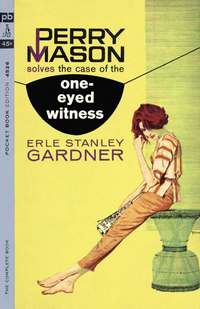 |
The Case of the One-Eyed Witnessby Erle Stanley Gardner Mass Market Paperback, 210 pg. Read: October 19-20, 2021 |

What’s The Case of the One-Eyed Witness About?
While out for dinner with Della Street, Perry Mason gets a call from an unidentified person wanting to hire him for a job. She’s even arranged for some money for a retainer to be delivered to him at the restaurant—she just needs him to act on some information included with the cash. It’s a matter of life and death, she says, before the call ends.
Trying to earn his (pretty small) retainer, after he gets the delivery, Mason tries to track down his new client—and then he completes his assignment.
In the course of trying to figure out who his client is, Mason comes across a murder, and then another. He finally finds someone who he thinks is the client—and she denies that up until she gets arrested for murder, and then she’s more than ready to hire him.
Mason goes up against the Washington Generals of the legal system, Hamilton Burger and Lt. Tragg, as well as some pretty clever witnesses in his efforts to get to the bottom of this mystery. But while things frequently look grim for his client, it’s a sure bet that Mason will make sure justice is done.
Perry Mason, Micromanager
So Paul Drake is supposedly one of the best P.I.’s around—he’s got a sizeable agency of capable detectives, too. But you wouldn’t know it, the way that Mason ordered him around the investigation. I was taken aback by it, I have to say. It’d be different if this was Drake’s first case for Mason—or at all—but for a guy with his kind of experience? Sorry, Perry, trust the man to do it right.
There’s A Lot of Ugly Here
This was originally published in 1950, and you can tell in many ways. One of which is the casual usage of ethnic slurs about Japanese people. It’s not the first time I’ve read a book from this era (or earlier), I know this stuff is there—and I normally wince and move on. But it seemed a bit heavy in this book. I think—I don’t know, but I think—it’s there purposefully. That doesn’t make it easier to read. But if I’m right, it allows me to want to read more Gardner.
The reason I think the racist language is intentional is that prejudice against Japanese people is at the core of the plot—I’m not saying it’s a hate crime. But this story is only possible in a society where this prejudice is this prevalent.
I don’t know why I’m being cagey with spoilers for a book seven decades ago, but old habits, I guess.
At the end of the day, I can still enjoy this and see the racism as a disturbing cultural relic. And maybe as a sign of how far we’ve come (though, we obviously have further to go).
Nostalgia Trip
As best as I can remember, a few months after I fell in love with the Perry Mason show in syndication, I girded my loins and crossed that line between the “Juvenile” and “Adult” shelves at my library for the first time to see if I could find some books by the guy listed in the credits. They didn’t have a complete set—but boy howdy, they had a lot of them. A few years later, when we moved to a new city, I was disappointed to see that their Gardner collection was smaller—but at least they had a couple I hadn’t read.
For some reason, about the time I left college, I stopped hunting down unread novels and stopped re-reading them, too. I’ve thought about dipping my toes back in, but hadn’t gotten around to it. Until a couple of months ago and I found myself in front of a large selection of used paperbacks—including one that was new to me.
Reading this took me back—from the list of the Cast of Characters through to the end, it was like stepping back into a world I’d forgotten. I remembered the characters (and how they differed from their TV portrayals), the snappy dialogue, and quiet humor. I got a huge hit of nostalgic warm and fuzzies from reading this one.
So, what did I think about The Case of the One-Eyed Witness?
I don’t think this was one of Gardner’s best, but it’s like what they say about pizza. Even if it’s bad, it’s still pretty good. And this wasn’t bad—it just wasn’t great.
I do think the plot was unnecessarily convoluted, but it was necessary to get Mason exposed to everything he needed to lead up to the big gotcha moments in the courtroom, and to Mason solving it. It was a satisfying conclusion, too. Enough that I don’t care about how complicated the trip to the conclusion was.
I had a great time reading this—and I think anyone who loves a good bit of courtroom drama will, too. If you haven’t read a Perry Mason novel before, this might not be the best one to start with. But you should give one of them a shot—I can’t imagine it’ll be another two-and-a-half decades before I try another.

This post contains an affiliate link. If you purchase from it, I will get a small commission at no additional cost to you. As always, opinions are my own.
![]()

